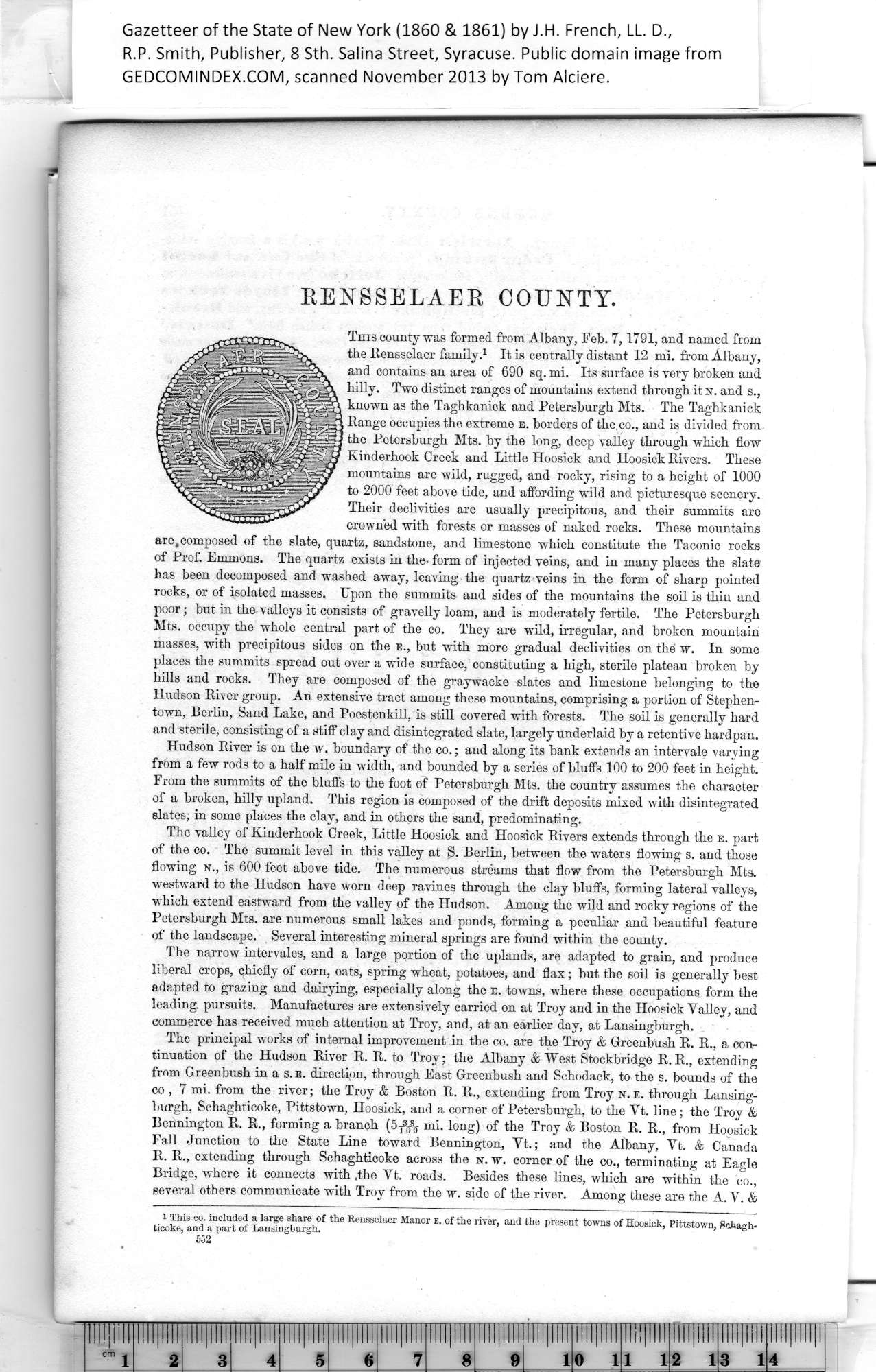|
RENSSELAER COUNTY.
This county was formed from Albany, Feb. 7,1791, and named from
the Rensselaer family.1 It is centrally distant 12 mi. from Albany,
and contains an area of 690 sq. mi. Its surface is very broken and
hilly. Two distinct ranges of mountains extend through it n. and s.,
known as the Taghkanick and Petersburgh Mts. The Taghkanick
Range occupies the extreme e. borders of the co., and is divided from
the Petersburgh Mts. by the long, deep valley through which flow
Kinderhook Creek and Little Iloosick and Hoosick Rivers. These
mountains are wild, rugged, and rocky, rising to a height of 1000
to 2000 feet above tide, and affording wild and picturesque scenery.
Their declivities are usually precipitous, and their summits are
crowned with forests or masses of naked rocks. These mountains
are,composed of the slate, quartz, sandstone, and limestone which constitute the Taconic rocks
of Prof. Emmons. The quartz exists in the- form of injected veins, and in many places the slate
has been decomposed and washed away, leaving the quartz veins in the form of sharp pointed
rocks, or of isolated masses. Upon the summits and sides of the mountains the soil is thin and
poor; but in the valleys it consists of gravelly loam, and is moderately fertile. The Petersburgh
Mts. occupy the whole central part of the co. They are wild, irregular, and broken mountain
masses, with precipitous sides on the e., but with more gradual declivities on the w. In some
places the summits spread out over a wide surface, constituting a high, sterile plateau broken by
hills and rocks. They are composed of the graywacke slates and limestone belonging to the
Hudson River group. An extensive tract among these mountains, comprising a portion of Stephen-
town, Berlin, Sand Lake, and Poestenkill, is still covered with forests. The soil is generally hard
and sterile, consisting of a stiff clay and disintegrated slate, largely underlaid by a retentive hard pan.
Hudson River is on the w. boundary of the co.; and along its bank extends an intervale varying
from a few rods to a half mile in width, and bounded by a series of bluffs 100 to 200 feet in height.
From the summits of the bluffs to the foot of Petersburgh Mts. the country assumes the character
of a broken, hilly upland. This region is composed of the drift deposits mixed with disintegrated
elates, in some places the clay, and in others the sand, predominating.
The valley of Kinderhook Creek, Little Hoosick and Hoosick Rivers extends through the e. part
of the co. The summit level in this valley at S. Berlin, between the waters flowing s. and those
flowing n., is 600 feet above tide. The numerous streams that flow from the Petersburgh Mts.
westward to the Hudson have worn deep ravines through the clay bluffs, forming lateral valleys,
which extend eastward from the valley of the Hudson. Among the wild and rocky regions of the
Petersburgh Mts. are numerous small lakes and ponds, forming a peculiar and beautiful feature
of the landscape. Several interesting mineral springs are found within the county.
The narrow intervales, and a large portion of the uplands, are adapted to grain, and produce
liberal crops, chiefly of corn, oats, spring wheat, potatoes, and flax; but the soil is generally best
adapted to grazing and dairying, especially along the E. towns, where these occupations form the
leading, pursuits. Manufactures are extensively carried on at Troy and in the Hoosick Yalley, and
commerce has received much attention at Troy, and, at an earlier day, at Lansingburgh.
The principal works of internal improvement in the co. are the Troy & Greenbush R. R., a con¬
tinuation of the Hudson River R. R. to Troy; the Albany & West Stockbridge R.R., extending
from Greenbush in a s. e. direction, through East Greenbush and Schodack, to the s. bounds of the
co , 7 mi. from the river; the Troy & Boston R. R., extending from Troy n. e. through Lansing¬
burgh, Schaghticoke, Pittstown, Hoosick, and a corner of Petersburgh, to the Vt. line; the Troy &
Bennington R. R., forming a branch (5ts<j80- mi. long) of the Troy & Boston R. R., from Hoosick
Fall Junction to the State Line toward Bennington, Vt.; and the Albany, Vt. & Canada
R. R., extending through Schaghticoke across the n. w. corner of the co., terminating at Eagle
Bridge, where it connects with .the Vt. roads. Besides these lines, which are within the co.,
several others communicate with Troy from the w. side of the river. Among these are the A. V. &
1
This co. included a large share of the Rensselaer Manor E. of the river, and the present towns of Hoosick, Pittstown, Scha^li-
|
